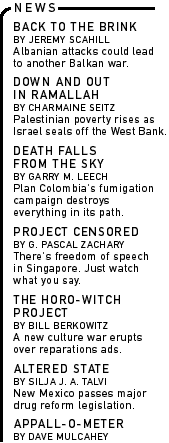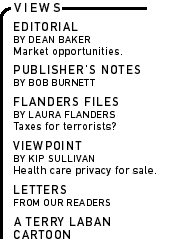

|

|

|

|
| |
||
|
Flanders Misfires Several premises of Laura Flanders' article on Iraq are absurd ("Media Bomb on Baghdad Story," April 2). It is impossible for journalists to check where bombs fall in Baghdad because the Iraqi regime does not allow them to visit such sites. The Baghdad regime is also known to scour hospitals to find "appropriate victims" to show the press following bombing raids. I am not defending the bombing raids--I have great sympathy for the gist of her argument--I'm just saying that the abhorrent behavior of the Iraqi regime is no less responsible for the current political quagmire than U.S. or British policy. Saddam Hussein was reported last year, for instance, to have emptied Baghdad's Radwaniyya prison of several dozen young, mostly Shi'ite opponents, taken them by bus to a remote location, then buried them alive in a pit. The West is clearly committing injustices in maintaining sanctions on Iraq's people, but Saddam is a disgusting thug. No question about it, and never forget that, or else your defense of "the poor Iraqi civilians" becomes a lame, limp argument without meaning. Edward Yeranian
Golden Grating While Sandy Zipp definitely does a better job of illustrating the gentrification process than the Rebecca Solnit book he reviews ("The Battle of San Francisco," April 2), he lets her off the hook too easily and also omits questions of race and class--a discourse that artists conveniently ignore. Property values are racialized. A building, with solely black or Latino tenants has a lower value. But once a white "artist" moves in, the property value goes up. Evictions and displacement were already a fact of life for blacks and Latinos in San Francisco in the '60s (thanks to urban renewal and despite white flight). Now that the ghettos are becoming no more, blacks and Latinos are losing their community to the sons and daughters of white flighters and being forced out to the least desirable postindustrial suburbs--where they still pay more for both housing and transportation to their jobs. The sons and daughters of the white flighters celebrate an imagined community of artists and wannabe-sophisticated types. These middle-class kids pretending to be poor only hurt those who are involuntarily poor, disrupting everything from access to low-cost housing to bargains at the Goodwill. The imitation poor move in, prices go up, and the real poor have even less consumer power. The crisis that Solnit talks about is only a crisis because it affects her tribe of urban missionaries, homesteaders and outcasts. The artists that she defends are not as numerous as she would imply--just large enough to homestead on the city's real estate frontier. Having been born and raised in San Francisco, the only artists I knew growing up were graffiti artists and muralists attempting to claim the Mission District as our turf while city planners tried to remove us. There are more than two sides to this story, and this one needs to be included. Michael Calderon-Zaks
Not long ago I was in a restaurant in Lake Tahoe outside of San Francisco, sitting, I soon learned, next to a table full of developers. Three couples composed of plastic women and well groomed, seal-like men. I couldn't help but overhear their conversation, which turned on the profitability of developing various properties around the city, and eventually settled on the new board of supervisors who were "undemocratic" and "positively dictatorial." They found themselves surprised to be fans of Willie Brown. "Who would imagine that I'd be voting for Willie Brown," one surprised matron commented, "the lesser of two evils." "You knew what you got when you bought Willie," said another. "Yes," the matron concurred, "he stays bought. And that's the best you can ask for in a politician." Indeed, San Francisco was sold out by a mayor bribed by developers maximizing their profits at the expense of the majority of the residents and thereby making the city a bedroom community for the Valley, a semi-suburban playground for wealthy commuters carefully expunged of the less wealthy, the discomfiting and ultimately of all character. I moved to Oakland. David Gessel
We Love You Too I've been reading In These Times since the mid-'70s, when I was a high school kid in rapidly deindustrializing Chester, Pennsylvania, dreaming of a career in journalism, inspired by things like the anti-nuke movement and Woodward and Bernstein. I was a news junkie, and noted that In These Times was a tabloidish publication that seemed to publish the really important stories three years ahead of everybody else. In These Times taught me what news really was, and even six years at the Annenberg School in Philadelphia couldn't take that away. Over the decades, In These Times has been a constant, as is my recommending it to anybody who'll listen. I just renewed my subscription for two more years, even though occasionally you do something really stupid, like blast Nader voters and demand we cash in our consciences for strategic support of the Democratic Party that has been turning its back on people like mine. Even so, the arrival of each issue is cause for excitement in this household. There are so few truly, sustainedly progressive "discursive spaces" to go to these days. In These Times always stays grounded in issues, like equity, not in labels like socialism, and that is such a breath of fresh air. I moved from Wisconsin to San Francisco two years ago (terrible timing, by the way) and am now in Berkeley. There is something of a true progressive renaissance going on here, owing to the excesses of the Silicon Oligarchy. But having just gotten back from my 10th Upper Midwest Organic Farming Conference, I still feel that the Upper Midwest is where progressivism is incubating, and where it is radiating from. In These Times has three fingers, Chinese-medicine style, on the pulses of Robert LaFollette's dream, as well as the present realities. Every so often I like to toss you a few lines and rave about how glad I am that In These Times exists and continues to be so damned outstanding. Only a few institutions have earned my undying loyalty, and In These Times has been one of them for over 25 years, right up there with constitutional democracy and the State Capitol Credit Union in Madison. Michele Gale-Sinex
|

